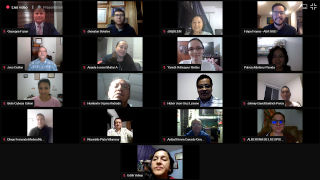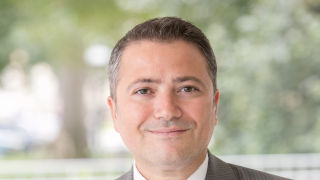Criminal Justice Professor Tapped Again for ABA’s Rule of Law Initiative in Colombia
Thursday, September 23, 2021
The ABA's Rule Of Law Initiative is designed to strengthen the capacity of the Rodrigo Lara Bonilla Judicial Training School in addressing Colombia's dynamic justice challenges and the needs of a diverse judicial system. Specifically, the program focuses on improving the administration of judicial education, especially with respect to criminal law. The training of new judges and continuing education of experienced judges is thought to be crucial to Colombia's judicial system. In that vein, the program is designed to support host country partners in enhancing access to judicial education opportunities for Colombian judges and court personnel.
A subject-matter expert in the field of court administration, Fazari's consultation and professional work experience in the field spans 5 continents, as well as several states throughout the United States. Most recently, he co-facilitated a presentation entitled, "How Ebola Prepared a Judiciary at the Epicenter of Covid-19," that launched the National Association for Court Management annual conference held in San Diego, California and was based on a continuity of operations plan that he oversaw while working as a court executive in the New Jersey Judiciary.
In 2019, Professor Fazari was engaged by the United States Agency for International Development (USAID) to help strengthen the administration of justice in the Supreme Court of the Ukraine. Focusing on caseflow management and policies and procedures designed to improve courtroom procedure, Fazari designed and delivered training to the Supreme Court. In 2020 he was reengaged as a subject matter expert by USAID for the Nove Pravosuddya Justice Sector Reform Program (New Justice) in Ukraine, focused on providing a road map to the burgeoning democracy for jury trial reform.
Widely known for his award-winning documentary, Why They Kill, at Seton Hall this year Professor Fazari is teaching Victimology, Criminal Justice Complex, Penology, Criminal Courts and The Juvenile Justice System.

The five seminars Fazari co-facilitated in Colombia consisted of the following:
The Leadership segment sought to anchor the individual and the organization to the court's core values and principles and infused the important concepts of purpose, passion, intensity, consistency, integrity, and accountability into the daily work of the court in achieving its short and long-term goals.
The Ethics seminar focused on promoting and ensuring a commitment to the court's enduring values in accordance with 12 principles: impartiality, personal integrity, professionalism, confidentiality, decorum, the appearance of decorum, the prohibition against giving legal advice, public service, competence, anti-discrimination, non-harassment, and the proper use of technology to better facilitate efficiency in the name of procedural fairness and due process.
The Implicit Bias session discussed the importance of utilizing an Inclusion, Diversity, Equity and Awareness approach within the court. Perception and perspective exercises were used to demonstrate the real-world implications of implicit bias as well as how to incorporate five strategies to mitigate prejudices and enhance cultural competency.
The Procedural Fairness workshop explored the concept through four pillars: respect, voice, impartiality, and trust. A range of strategies were addressed to promote and improve access, diversity, equity, and public trust and confidence in Colombia's judicial system.
The final clinic on Court Technology identified methods that the courts could incorporate into their processes to adapt to the constraints of the COVID-19 pandemic. Among other key components of the course, participants were introduced to the different technological tools and innovations and how each could be applied to improve court performance and efficiency.
Categories: Arts and Culture







